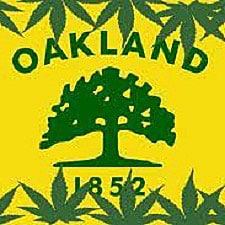 Oakland’s 10-year-old Measure Z ushered in a new chapter for reform
Oakland’s 10-year-old Measure Z ushered in a new chapter for reform
By David Burton
When legalization activists talk about reforming America’s marijuana laws for the better, they often point to the city of Oakland as an example of how to do it right.
The Bay Area city has the most pot-friendly laws of any municipality in the nation. Part of this is because of Oakland’s 2001 medical cannabis dispensary ordinance, which provides a clear set of rules on how to obtain permits and keep them. But much more significant was the passage of Measure Z, a 2004 voter initiative requiring–among other things–City Hall to treat “private adult cannabis offenses” as law enforcement’s lowest priority.
Although it received relatively little fanfare in the national media, Measure Z represented a revolutionary change in public drug policy. Stopping just short of outright legalization, the law effectively called for an end to the practice of indiscriminately arresting adults for simple possession and small-time sales–a remarkable reform made all the more astonishing given the Oakland Police Department’s previously harsh attitude toward drug offenders.
But, seven years after its enactment, has Measure Z lived up to its promise of wholesale change in how local government treats marijuana and its users? According to some of the people who created the law, the answer is a qualified “yes.”
For proof, they quickly point to northern downtown Oakland’s reputation as “Oaksterdam,” the epicenter of a cannabis reform movement now sweeping the nation. They cite the city’s 5-percent tax on marijuana sales transactions marijuana business tax–the seeds of which were planted in the language of Measure Z. They nod to the existence in Oakland of more than a dozen “Measure Z clubs”–private establishments where patrons can buy and consume marijuana products onsite.
But they also just as quickly acknowledge that the law isn’t perfect, and that, in hindsight, they would have written it a bit differently.
One area in which Measure Z’s proponents ran into particular trouble was with what actually constitutes “private adult cannabis offenses.” Oakland Police are required to give low priority to arresting those who use pot privately. But what if that “private use” is occurring inside a coffee bar used by the public?

“The one mistake we made was we didn’t define ‘private,’” says Richard Lee, the cannabis entrepreneur and activist who bankrolled the ultimately unsuccessful Proposition 19 and whose group, the Oakland Civil Liberties Alliance, helped put Measure Z before the city’s voters. Lee is currently chairman of the Measure Z Committee, a panel made up of marijuana industry representatives from each of the city’s seven districts and officials from the city auditor’s and city administrator’s offices
‘“Private’ has a lot of different meanings,” he says. “There’s a difference between public property and private property, but then there are private establishments that are open to the public.”
After running into significant trouble with law enforcement and city officials over the use of marijuana in public places, Lee and others sought to settle the problem by restricting public access to Measure Z clubs to members only.
“You have to request access to a Measure Z club to get in, which makes it private–you can’t just walk in off the street,” says Lee. “They issue membership cards and you have to be a member. Some of the clubs have been located in the backs of establishments, like coffee shops. The front is open to the public, but the back is a private club area.”
Crunching Numbers
Data provided by the FBI shows that while drug possession and sales arrest rates in Oakland actually increased from 3,296 in 2007 to 3,874 in 2008, they dropped to 3,421 the following year. In 2010, the total number was 2,705–an approximately 21-percent decrease in crime in the city over the year before.
Article from Culture Magazine and republished with special permission




